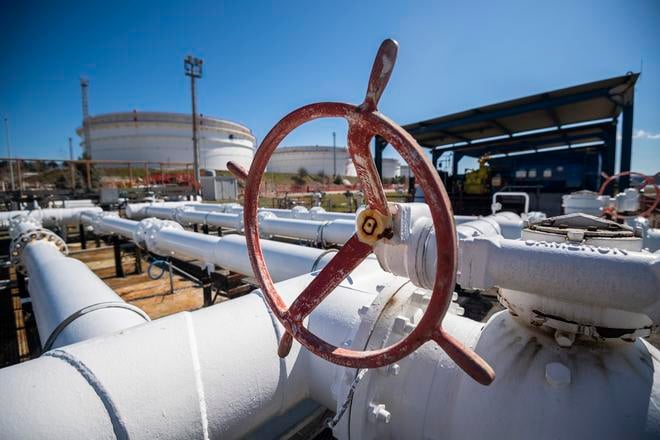Slovakia risks losing its supply of Russian oil after Ukrainian lawmakers began mulling a halt to the transit of oil via the Druzhba pipeline. Slovakia lost access to Russian gas at the beginning of this year, following Ukraine's decision not to renew a transit agreemeent with Russia. Now Ukrainian MPs, led by former president Petro Poroshenko, are advocating a law to ban the transit of any Russian resources through Ukrainian territory. The initiative aligns with Ukraine's broader strategy to weaken Moscow’s war capabilities.
The proposal comes amid tensions between Prime Minister Robert Fico and Ukraine. After Ukraine's gas transit halt, Fico threatened to stop supplying electricity to Ukraine, whose generating capacity has been targeted by Russian military attacks in the course of its ongoing war against Ukraine. Fico has also threatened to cease humanitarian support to Ukraine and limit assistance to Ukrainian refugees in Slovakia. “If necessary, we’ll stop electricity supplies, which Ukraine urgently needs during power outages,” Fico said. He claimed that Slovakia faces a "gas crisis".
However, Slovakia is better prepared than his comments suggest, experts say. Slovenský Plynárenský Priemysel (SPP), the country's main gas provider, has contracts with global suppliers like BP, Shell, ExxonMobil, Eni and RWE, ensuring gas supplies through 2025. Switching from the Russian piped supply will, however, incur additional costs, estimated at €90 million annually.
The potential halt in oil transit would similarly affect Hungarian oil company MOL, which operates Slovakia’s Slovnaft refinery in Bratislava. MOL, which is heavily reliant on Russian crude, is in the process of adapting its facilities to refine oil from other sources. While this transition is costly – Slovnaft expects to spend €200 million on the transition – it is essential for energy security and diversification. Slovnaft currently sources 70 percent of its oil from Russia, though it plans to reduce this to 60 percent by the end of this year.
Oil income helps funds Russia's war
Petro Poroshenko explained his push for the law as an effort to cut a vital funding stream for Russia’s war machine. “Russian oil flowing through Druzhba generates over US$7 billion annually, enabling Putin to finance the war,” he argued.
He calculated that banning oil transit could reduce Russia’s revenue by US$13 billion annually, or 10 percent of its military budget. Russia has increased its annual military spending by 28 percent, indicating that Putin does not plan to end his military aggression against Ukraine as a result of diplomatic pressure.
Poroshenko also highlighted the urgency of outmanoeuvring Russia, which could bypass Ukraine by using alternative routes or its "shadow fleet" of unregulated, older tankers. These tankers, often uninsured, transport Russian oil to markets like India and China, posing severe environmental risks.
The potential Druzhba shutdown underscores regional energy security challenges. The Czech Republic, in coordination with Germany, Italy, and Austria, has prepared alternative pipelines through the TAL and IKL networks. These projects are nearing completion and will significantly reduce Czech reliance on Russian oil.
For Slovakia, the situation is more complex. Transpetrol, the Slovak oil transit company, depends heavily on revenue from Druzhba. While increased storage demand offers some compensation, it is unlikely to offset losses from reduced oil transport.
If the Ukrainian parliament approves Poroshenko’s proposal, the government will have three months to prepare an implementation plan. This process will involve coordination with international partners to mitigate diplomatic and economic repercussions.


